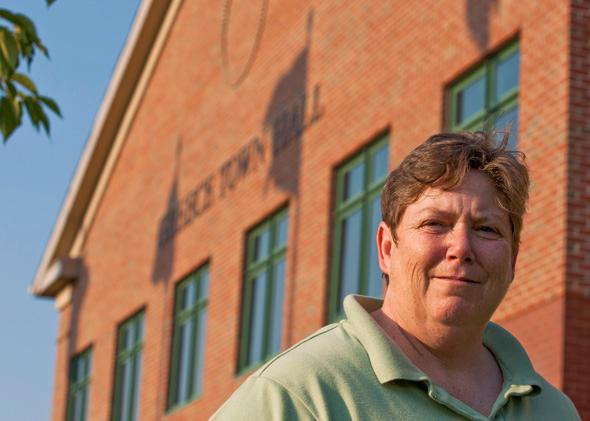In 2007 Susan Galloway started going to town board meetings in the town she lived in, Greece, N. Y., to voice support for public-access cable television. Linda Stephens attended several meetings to weigh in on a plan to build a disc golf course at a park. The women arrived to discover that their town board had adopted a new practice: opening each meeting with a prayer. Galloway is Jewish, and Stephens is an atheist. Both felt that they should not be told to bow their heads and join a collective prayer—a prayer in which they could not in good conscience participate—in order to petition their local government. They filed suit claiming that the town board prayer is an unconstitutional establishment of religion.
This week the Supreme Court will hear this challenge. There’s a lot riding on this case. In past rulings the court has drawn a line in the constitutional sand: The state cannot coerce people to join or participate in religious activities. If the court now blurs that line, government will have more power to tell citizens when, if, and how they should pray. The more power government has over religion, the more likely it is that this power will be abused.
Members of both the U.S. House and Senate (most of them Republican) disagree. They insist this is an easy case. They note that Congress begins its sessions with a prayer and point to a 1983 Supreme Court ruling that upheld the practice of opening a state legislative session this way. They say that prayers before a town board meeting are the same thing. But they’re wrong. And that’s the key to this case.
Town board meetings have a fundamentally different function from state or national legislative sessions. Most audience members in the gallery of Congress or a state legislature are simply observers. They can sit in the gallery, or they can watch the legislature on C-SPAN. Either way they’re in the same passive role. By contrast, most citizens attend town board meetings to participate in government. They come to speak up and to petition and influence the board as it makes decisions that matter locally. Much of the work of town boards involves political disputes that impact small groups, neighborhoods, and, sometimes, individual residents. Attending a town board meeting is much more like appearing in court than watching a legislative vote.
And this is where the constitutional problem lies. If your case was being argued before a judge, and he asked you to pray with him at the start of a trial, wouldn’t you feel pressured to comply? Ideally, if you declined, neither a judge nor a town board would hold your unwillingness to join in their prayers against you. In actuality, the risk of alienating the official with decision-making power would probably weigh heavily. Like a courtroom, a town board meeting is up-close and personal. If you decide not to pray, everyone, including the members of the board, will see you sitting silently or leaving the room while the rest of the audience stands and bows their heads.
If you think about it, this is a scenario that’s more prone to coerced religious observance than a graduation ceremony in which students are asked to stand in prayer. And the Supreme Court has already ruled that prayers at public high school graduations are unconstitutional.
There’s another problem with this particular town’s prayer offerings: According to the U.S. Court of Appeals for the 2nd Circuit, the town didn’t do a good job of making sure the prayers reflected diverse religious viewpoints. From the time they began in 1999 through the point in 2007 when Galloway and Stephens began raising concerns, every single prayer had been Christian, as was every clergy member on the list the town board used to choose its “chaplain of the month.” In 2008, after the suit was filed, the town finally started letting non-Christians volunteer to do the prayers, and that year they had two prayers from a Jewish leader, one from a Baha’i leader, and one offered by a Wiccan. In 2009 and 2010, the prayers went back to being all Christian. The Appeals Court struck down the town’s prayer practice in light of this poor record, saying it unconstitutionally endorsed Christianity.
True, but Galloway and Stephens should win not just because the prayers were almost always Christian. The government can’t burden religious freedom by pressuring people to pray, period. That pressure is unavoidable in the context of a town board meeting.
The critical principle is this: Courts have to intervene when the government coerces people into religious observance. If the Constitution’s prohibition on the establishment of religion means anything, it should mean that a citizen need not choose between the right to petition his government and the right not to pray.
